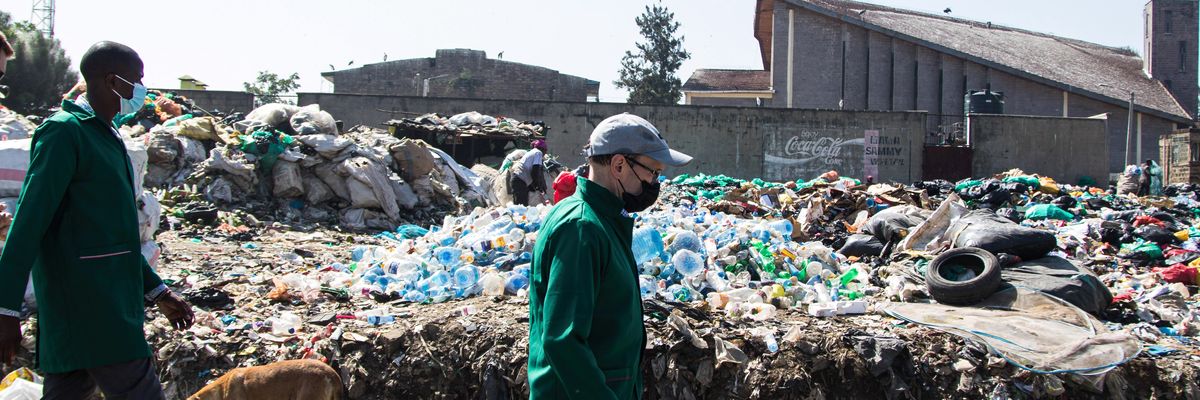More than 170 civil society groups and scientists warned Monday that lobbying by the deep-pocketed fossil fuel and petrochemical industries poses a dire threat to efforts to establish an effective global treaty curbing plastic pollution, which has inundated communities, waterways, and oceans across the planet with toxic waste.
In a letter to U.N. Environment Program (UNEP) executive director Inger Andersen and Intergovernmental Negotiations Committee for Plastics executive secretary Jyoti Mathur-Filipp, 174 advocacy organizations and scientists wrote that "the fossil fuel lobby is actively working to prevent the Plastics Treaty from containing essential controls on plastic production."
"Given the industry's power and influence—both within the U.N. and over national and regional governments—there is a strong risk that, unless measures to inhibit their influence are put in place, it will be impossible to negotiate the Global Plastics Treaty that people and the planet need," reads the letter, which comes a week before the Second Session of the Intergovernmental Negotiating Committee on Plastic Pollution (INC-2) is set to begin in Paris.
The letter's signatories are calling on the U.N. to take concrete steps to resist lobbying pressure from the fossil fuel industry, which is heavily invested in expanding plastic production—a process that relies on fossil fuels. Reutersreported last year that while "plastic industry groups representing firms like ExxonMobil Corp., Royal Dutch Shell Plc, and Dow Inc. have expressed support for a global agreement to tackle" global plastic pollution, they have privately been "devising strategies to persuade conference participants to reject any deal that would limit plastic manufacturing."
In response, the civil society groups and scientists are imploring UNEP to "urgently establish an Accountability Framework, including a regime-wide conflict-of-interest policy."
They're also urging the U.N. to control "polluting industries' infiltration of negotiation spaces" and guarantee that "the voices of independent scientists are heard."
"Currently too many of the scientific studies that inform member States and decision-makers are funded by industries with vested interests—making it extremely difficult to ensure facts and data are free from industry influence," the letter states. "This conflict of
interest effectively challenges the meaning of best available science and therefore cannot guarantee negotiations in good faith."
Last year, U.N. member states endorsed a resolution agreeing to establish a global, legally binding treaty regulating plastics through their full lifecycle—from production to disposal—by the end of 2024.
If allowed to continue unabated, plastic production is expected to triple by 2050, dooming efforts to clean up the world's plastic-ridden oceans.
Following the first round of treaty negotiations in December 2022, Greenpeace and other advocacy groups warned that major oil-producing nations—including the United States—slow-walked the discussions and attempted to curb their scope "at the behest of big oil and petrochemical companies."
It's clear that similar concerns will be prominent as the second round of treaty talks kicks off next week.
Louise Edge, global plastics campaigner for Greenpeace U.K., said Monday that "the Global Plastics Treaty is a once-in-a-generation opportunity to solve the plastics crisis."
"Whether it succeeds or fails depends on whether governments are bold enough to ensure that the treaty delivers what the science says is needed—a cap and phase down of plastic production," said Edge. "This essential measure will be fiercely resisted by the fossil fuel and petrochemical industries that profit from plastic."
"We are urging the U.N. to listen to the millions of people around the world who want an end to plastic pollution, rather than the interests of the oil and gas lobby," Edge added.
